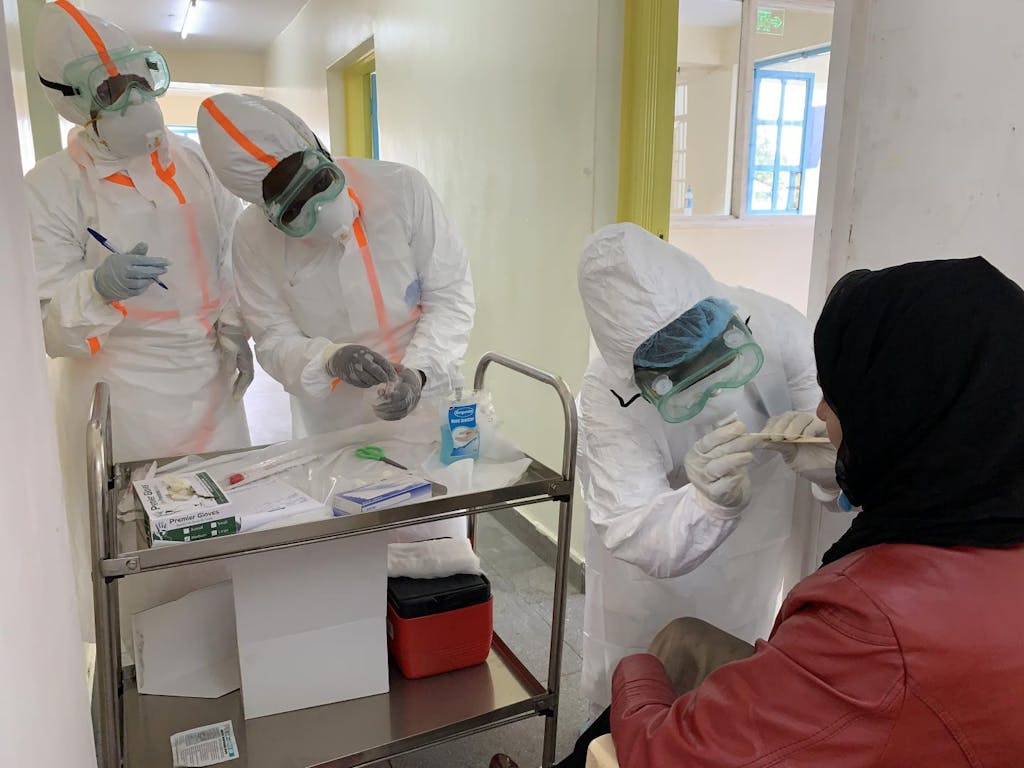Last week, the world’s most powerful leaders agreed to observe physical distancing guidance, when they gathered — virtually — for a special G20 Leaders’ Summit to address the COVID-19 crisis. Each of them acknowledged that the pandemic presents an unprecedented challenge to us all, one that serves as “a powerful reminder of our interconnectedness and vulnerabilities.”
In their statement at the end of the summit, leaders committed to doing “whatever it takes to overcome the pandemic.” Chief among their commitments is injecting $5 trillion into the global economy to limit the economic and social impacts.
On the frontlines, the G20 said it supports strengthening the mandate of the World Health Organization (WHO) to coordinate the international fight against the pandemic, including “the protection of front-line health workers, delivery of medical supplies, especially diagnostic tools, treatments, medicines, and vaccines.”
In fact, WHO has been in the fight for months already. Among other things, it has already sent 1.5 million test kits to 120 countries, as well as 2 million pieces of protective equipment to health workers in 68 countries. Ongoing efforts will ramp up help to develop vaccines, tests, and treatments.
WHO’s work is aimed at ensuring all countries are prepared to prevent, detect, and respond to the virus, especially where the needs are greatest — and that’s often in countries with the weakest health systems. And while the G20 reaffirmed that we must tackle this virus on a global scale, it also committed to taking all measures to protect the most vulnerable.
Here are three reasons why we cannot neglect vulnerable communities everywhere.
1. This Virus Doesn’t Care Where You Live
Diseases don’t respect borders: We’ve seen COVID-19 spread to every corner of the world in just three months. COVID-19 is reaching more and more areas of the world grappling with conflict, natural disasters, and climate change. Just a few weeks ago, Africa had fewer than five countries with imported cases. As of March 30, sub-Saharan Africa had 39 countries affected.
As UN Secretary-General António Guterres said at the recent launch of a new appeal to governments to fund a $2 billion global humanitarian response plan to fight COVID-19, “If we leave coronavirus to spread freely in [the world’s most vulnerable] places, we would be placing millions at high risk, whole regions will be tipped into chaos and the virus will have the opportunity to circle back around the globe.”
G20 leaders expressed a clear sense of solidarity with the world’s most vulnerable, saying in their joint statement, “We will strengthen capacity building and technical assistance, especially to at-risk communities. We stand ready to mobilize development and humanitarian financing.”
2. Existing Health Challenges Create Greater Needs
In many countries of Africa, for example, “flattening the curve” will not be as straightforward as it is for other countries of the world. As WHO’s Regional Director for Africa, Dr. Matshidiso Moeti, explained recently, African countries face a number of existing challenges:
- Although COVID-19 is most harmful for the elderly, much of Africa’s young population has a number of underlying health conditions that make the virus more deadly: HIV, malnutrition, measles, and more.
- Africa accounts for 16% of the global population, but it accounts for just 1% of global spending on health care, meaning that with such limited funding, existing health resources would need to be directed away from other critical health challenges.
- Social distancing and hand washing are not always possible in some home environments where there is no access to sanitation. In many countries, less than half of healthcare facilities have adequate access to water or sanitation.
Importantly, many African countries have reacted swiftly to the pandemic: South Africa entered a national lockdown, Nigeria closed schools and universities, and several governments banned travel from high-risk countries.
But now that a number of these countries are seeing local transmission, support to overcome existing vulnerabilities will be absolutely essential.
3. WHO is Already Leading Response in Vulnerable Communities, Working Hand-in-Glove with Other UN Agencies
G20 leaders expressed grave concerns about the risks of COVID-19 in small island states and African countries and pointed to the latter as a crucial battleground, “We consider that consolidating Africa’s health defense is a key for the resilience of global health,” they said. WHO has been hard at work to help local officials and frontline health workers in places that need it the most, in accordance with its current Strategic Preparedness and Response Plan:
- In Africa, for example, WHO has already trained Rapid Response Teams, made up of local health workers and officials, in 36 countries. Taking lessons learned from the Ebola outbreak in 2014-2016, WHO has helped these teams conduct, “contact tracing,” for COVID-19, so they can find and isolate cases early on.
- WHO has also sent essential personal protective equipment — like masks and gloves — to at least 24 countries in the region, and a second shipment is being prepared for countries with confirmed cases.
- And looking ahead to worst case scenarios, WHO is working hand-in-glove with governments to plan and ramp up ICU capacity in the Africa region.
These actions, of course, don’t cover everything, but they provide a snapshot of how gaps are being filled — in real time — on the ground with the help of WHO and other UN partners. And they show how this vital, coordinated work needs to be scaled up. There has never been a more important need for global solidarity or a more urgent time to support the work of WHO.

As G20 leaders framed our current state of affairs, “Global action, solidarity and international cooperation are more than ever necessary to address this pandemic.”
The pandemic has shown us we all depend on each other, and we must all play our part.
More than 200,000 people and organizations around the world have already stepped up by donating to the COVID-19 Solidarity Response Fund, established by the UN Foundation and our partner Swiss Philanthropy Foundation to support WHO’s global COVID-19 response. It’s the only way for individuals, businesses, and philanthropies to directly contribute to WHO’s work to fight this virus. The G20 even called out the Solidarity Fund in their statement, recognizing the importance of all actors and all sectors in driving a truly global response.
donate today
Every donation makes a difference. Support WHO’s life-saving efforts to respond to the COVID-19 pandemic by giving to the COVID-19 Solidarity Response Fund. Donations made via Facebook will be matched up to $10,000,000. Through April 30, 2020, for every $1 you donate here, Google.org will donate $2, up to $5,000,000.
Photo: UN Photo/Evan Schneider



 View All Blog Posts
View All Blog Posts


